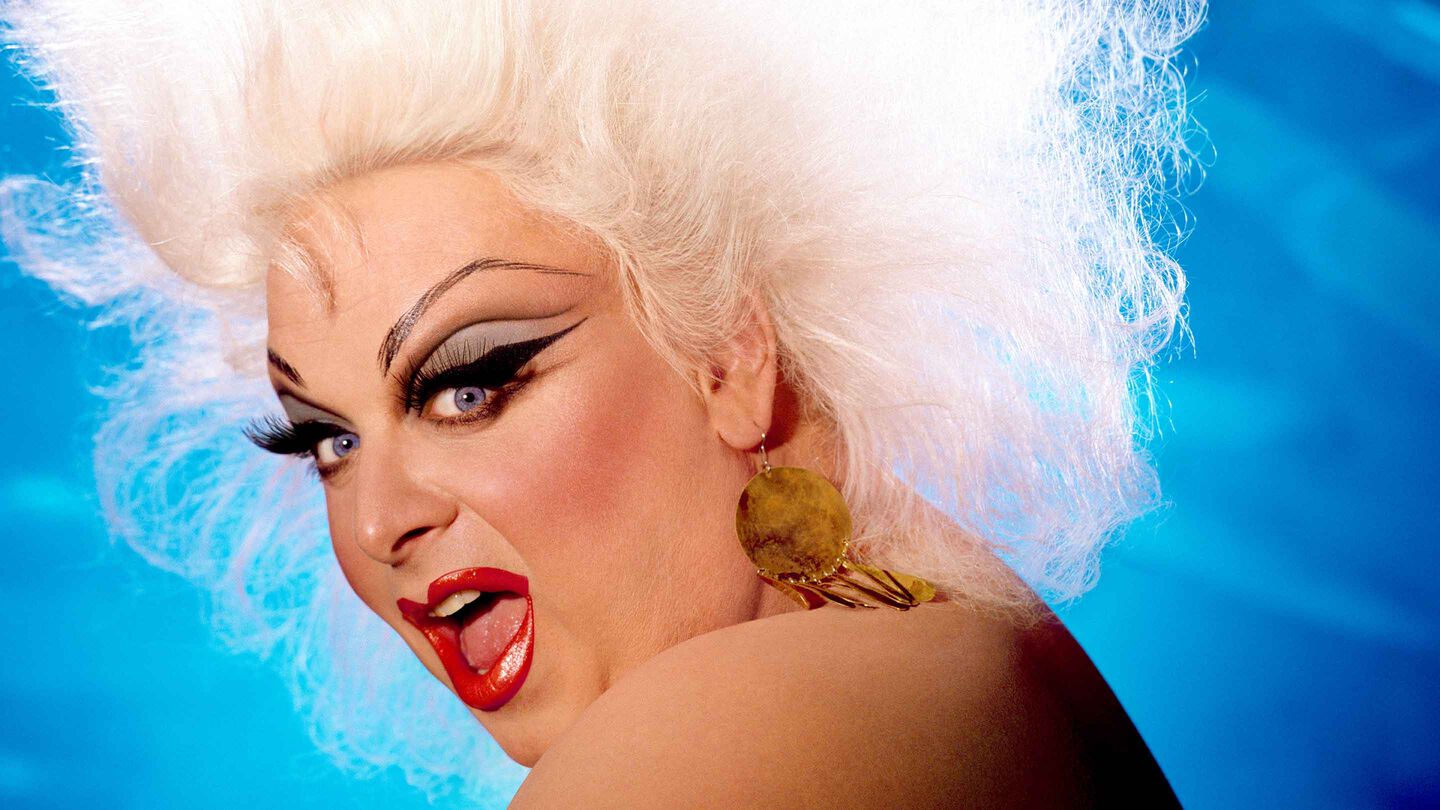At the 1993 VMAs, emcee Christian Slater announced a “perfect moment of [television] closure” when he introduced showbiz veteran Milton Berle and newcomer RuPaul, who shared the distinction of being regularly seen in drag on TV decades apart and nothing else. The unlikely duo swept onstage arm-in-arm to present the Viewer’s Choice Award, but the idyllic full-circle moment instantly descended into a live, two-alarm tiff, and “RudePaul” was slammed by the press for disrespecting his elders. She later revealed in Lettin’ It All Hang Out that Berle, not a professional queen but a crass TV comedian, had been tastelessly grabbing, pinching and groping her padding backstage, hence their spat at the podium.
But what neither “Mama” Ru, nor Christian Slater, nor Milton Berle, nor the VMA producers realized was that the ultra-leggy model-singer-actress’ recent celebrity was hardly a novelty signaling mainstream drag’s twilight, but rather its Big Bang. Today, RuPaul has left no rhinestone unturned in his quest for world domination, but the seemingly-impossible international media empire that started in the early ‘90s was inevitable in hindsight. After Divine’s untimely 1988 death, the world needed a new drag superstar, even if it didn’t realize it.
In the ‘90s (that’s the 1890s, keep up), drag was hugely popular, being gay wasn’t, and the two were not joined at the hip. In fact, 98 years before Milton and Ru’s catfight, Oscar Wilde was famously arrested — as famously as anything could be done in the days before television — and tossed in the pokey for the unspeakable crime of homosexuality just a month after the premiere of his greatest triumph, The Importance of Being Earnest, A Trivial Comedy for Serious People. While Wilde broke rocks in the hot sun as punishment for his affair with a Marquess’ hot son, playwright Brandon Thomas’ only noteworthy composition, Charley’s Aunt, was enjoying record-setting theatrical runs on two continents. A farcical play about a man in drag, it was revived a handful of times on Broadway all the way up to 1970, to say nothing of its international successes and countless film adaptations, proving that paying audiences have adored men in dresses as much as they’ve sneered at homosexuality.
Julian Eltinge, Vesta Tilley, electrifying Bert Savoy, Douglas Byng, acrobatic Barbette, all made big money and bigger names for themselves as live impersonators of the opposite sex from the Gay Nineties through the Roaring Twenties — if you ask Raquel Welch, she’d add Mae West to the list — but it was all too good to last. The rise of movies meant the end of vaudeville, which meant a sharp downturn in drag as a public service and its forevermore association with the gay community. If you were engaging in the art of drag by the late ‘30s, it was a labor of love with slim chance of crowds or coverage. Driven underground for the time being, recreational drag still managed to flourish in bars and ballrooms, or at least preserve itself in the face of the Lavender Scare. Poised and funny female impersonators like Danny La Rue, Jim Bailey, Lynne Carter and Craig Russell enjoyed successful live careers and TV appearances, but mainstream American drag was burly Bob Hope and jowly Jackie Gleason in polyester pumps.
Enter Divine.
Harris Glenn Milstead, who would’ve turned 75 on October 19, was a soft-spoken Baltimorean sissy who tipped the scales at 200 pounds, idolized Liz Taylor to the point of dressing like her, and spent every waking second with his parents until he turned 15, after which the cracked-and-splintered closet doors finally gave way. To curb his newly-developed wild side, they bought high- and beauty-school graduate Glenn a salon where he specialized in outrageous bouffants. With a body for sin but no head for business, he quickly grew bored by routine and soon all but gave his mother the shop so that he could sneak down to Washington, D.C., and compete in drag pageants. Milstead later said:
Well, I wanted to look good. After a while I saw the others were ridiculous and I couldn’t get into it, so I decided to have fun. That’s when I got comic and they really hated it ‘cause they thought I was making fun of them. Some queen threw a beer bottle at me one time and a huge fight broke out. Before you knew it, wigs were flying. We had to run.
Around the time it became clear he had no future in the underground drag pageants that prized glamour above all else (the more things change…), he met a similarly-aged neighbor who’d just been expelled from his first semester at NYU after a big pot bust, John Waters Jr., who rechristened Glenn ‘Divine.’ The pairing, now ranked alongside the likes of Hitchcock & Kelly, Griffith & Gish, David O. Russell and Jennifer Lawrence, became a hit on the midnight film circuit over the next few years with homemade trash masterpieces like Multiple Maniacs (1970), Pink Flamingos (‘72), and Female Trouble (‘74), which the 300-pound self-proclaimed “Most Beautiful Woman in the World” parlayed into successful stints in a pre-Dreamgirls Tom Eyen’s Off-Off-Broadway shows like Women Behind Bars (‘75) and The Neon Woman (‘78). Still, mainstream success and steady work eluded Divine.
Unemployed by day and a professional nightlife fixture after dark, Divine was rubbing shoulders with the likes of Elton John, Andy Warhol, Bianca Jagger, even Elizabeth Taylor, and a welcome staple in the heady, anything-goes disco nights of the late ‘70s. His social stock was skyrocketing, his name was splashed all over papers, but his career was stalled, no money was coming in, and certain other disco-era legends were certainly no help.
A horrified Ann-Margret once saw Divine at an event and exclaimed, “What the…? My God! Hideous!”, but in a 1981 interview with John Waters, published in his book Shock Value, Divine recalled that the only celebrity ever truly, openly hostile to him was Cher. At a très exclusive 1976 farewell party for band Three Dog Night, a photographer from Vogue Italia tried to snag a shot of the “Hog Princess” posing with TV’s reigning Queen, but Cher, not wanting to be seen alongside Divine, voiced her displeasure. The paparazzo retreated without a word or a click. “She dismissed me with a wave of her hand. I just looked at her and wanted to snap her nails off,” remembered Divine.
Then, in 1978, after pictures of the two feeding each other birthday cake were printed, Grace Jones sounded off about party guest Divine to a reporter from People magazine, saying, “I thought [Divine’s tossing around cake] was disgusting and in very bad taste … some people will do anything for a picture.”
Divine reteamed with John Waters for the successful Polyester (1981), co-starring out and not-so-proud ‘50s heartthrob Tab Hunter, who fondly recalled Divine’s professionalism years later. Around this time, Divine also kicked off an international music tour, but Milstead was chafing at the title “drag queen.” Already praised as a talented screen comedian and live performer, Divine was ready to hang up his cha-cha heels for good and prove his merits as an actor, but there just weren’t opportunities for him sans wig.
Non-Waters Western Lust in the Dust (1985) followed, in which Divine played sister to Lainie Kazan, a role originally offered to Chita Rivera (who was busy starring with Liza on Broadway in The Rink), then Shelley Winters, who refused to have a man play her sister. In his review, Roger Ebert called Divine “misused” and wrote, “This time she plays a timid, wistful soul, and it doesn’t work as well. We need her slinging people out the saloon doors.” Interview magazine’s Hal Rubenstein asked Divine in 1988 why he continued to perpetuate his drag persona to which he responded, “At this point, I can’t help it if others have a lot of misconceptions about what I do, if they’re not willing to believe I am a character actor and one of my characters just happens to be a loud, vulgar woman. Nevertheless, it hurts.” But while Divine ended the ‘70s being bullied by disco divas and unsure of his future, he seemed poised for takeoff by the late ‘80s.
John Waters and his muse would have the biggest mainstream success of their careers with their final collaboration, the shockingly family-friendly Hairspray (1988). Around the same time, Milstead was eagerly awaiting an out-of-drag supporting role on the fledgling Fox Network’s new sitcom Married … with Children. Three weeks after the world premiere of Hairspray, the night before he was due on set, Milstead died in his sleep of an enlarged heart. In his obituary, People mag named Milstead the “Drag Queen of the Century.”
By the time Married … with Children went off the air nine years later, RuPaul Charles was hosting The RuPaul Show on VH1, which featured guests like John Waters, Divine’s Hairspray co-star Debbie Harry, and Cher. ”This business is so fickle,” RuPaul told the New York Times in 1996, “you have to hit while the iron is hot.”




